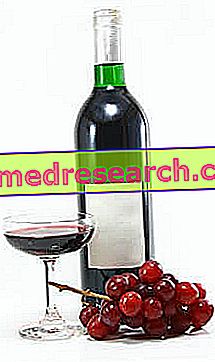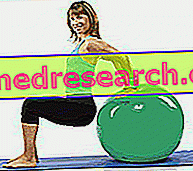What they are, utility, consumer protection and side effects

The athlete's body is in a precarious homeostatic balance where proper nutrition can affect performance and recovery times.
The billionaire business of food supplements is based on these simple considerations.
Becoming an athlete has never been so simple, the false myth of supplements
Considering the enormous stresses to which an athlete's body is subjected (training, competitions, etc.), integration in many cases becomes a need to cover the deficiencies of a diet that must respond to too many compromises.
We are talking about athletes, professionals who carry out particularly intense training and who are constantly followed by experts who can advise on the type of supplementation really necessary, depending on the physical conditions and the discipline practiced.
Today it seems that very little is needed to become athletes, doctors and sorcerers:
some gym sessions or jogging have become sufficient pretexts for taking food supplements;
given that everyone improvises as an expert and advises the other which supplements they probably take around there are more doctors and nutritionists than we thought;
given that it is no longer necessary to carry out medical examinations to ascertain the real needs of the organism, probably those who advise them have supernatural qualities
Many people are attracted to dietary supplementation because they think it can guarantee their well-being and vitality, or at least help improve their sports performance. But are they really sure or are they simply carried away by false enthusiasm?
The "fake" alibi of supplements
Natural substances
Choose a supplement at random, in all probability you will read on the package that it is a product based on natural substances normally present in the body.
So? In the common imagination a natural substance would be preferable because it has no side effects. And what is more natural than water? Well, try to drink 15 liters a day and let me know if it is really without side effects!
Too lame, you don't need a degree to figure it out. Unfortunately, however, the mirage of the "magic" supplement attracts many people, especially those who have little desire to sweat and who are always looking for the ideal shortcut to reach their goals effortlessly. No one thinks that an excess can be as damaging as a defect.
False scientific studies
Supplement manufacturing companies are always looking for the best way to enhance their products and what could be better than scientific research that underlines their beneficial properties?
Carrying out a study is not that difficult, just hiring a group of researchers and reporting the results on advertising leaflets. What is much more difficult is to obtain an official validation of the study. Unconfirmed data is worth less than the card on which it is written since there is no evidence of its truthfulness.
The properties of substances
Here is the reasoning that would justify the use of a certain supplement: since the substance x slows down the processes of cellular degeneration, assuming it with regularity it is possible to combat the effects of aging. Logical no? And now follow this reasoning: since water is essential to irrigate the fields, increasing the quantity of water per cubic meter will produce better quality products. Logical no? Try to water your flowers 5 times a day and let me know if they will grow more lush!
A drop in the sea
Those who believe they benefit from supplements should ask themselves at least three questions:
do I really need it?
are they dangerous to my health?
are they really effective?
On the last point we must not create too many illusions. Assuming that the product brings some benefit and that there is a real need for it, the improvements will still be modest. And it could not be otherwise. Our organism is regulated by a myriad of mircroregulations, intertwined in order to guarantee the stability of the system. Some significant improvement can be achieved only if there is a weak link in the chain and if the integrator acts on that element. In any case it is a drop in the middle of the sea, a bit like redoing a very ugly person, it certainly won't become beautiful after the surgery.
Beware of scams
Numerous cases of proven contamination of dietary supplements have been discovered. In many cases these are potentially toxic processing residues or doping substances added in small doses to increase the effectiveness of the product.
Back in 2001, the International Olympic Committee (IOC) analyzed the products of 215 different suppliers in 13 states. The results of the study showed that 14.8% of the samples were contaminated with doping substances not declared on the label.
States | Number of tested supplements | No. of "positives" | % of "positive" |
Holland Austria GB USA Italy Spain Germany Belgium France Norway Switzerland Sweden Hungary Total | 31 22 37 240 35 29 129 30 30 30 13 6 2 634 | 8 5 7 45 5 4 15 2 2 1 - - - 94 | 25.8% 22.7% 18.9% 18.8% 14.3% 13.8% 11.6% 6.7% 6.7% 3.3% - - - 14.8% |
11 different androgenic anabolic steroids were found, mainly testosterone and nandrolone precursors:
The opinion of those who support the usefulness of supplements
Some time ago on a rai, in a transmission by Bruno Vespa, a doctor was invited who openly opposed food supplements. The comment of the owner of a supplement store near home was: "That doctor is an ignorant subject, pharmaceutical companies will have given him a ferrari, supplements are useful, better to prevent deficiencies than cure them, but there are too many interests middle". And then to give an example he tried to explain to me that if everyone took alpha lipoic acid, there would be far fewer cases of diabetes and pharmaceutical companies would lose a lot of money.
But according to you, if the international pharmaceutical giants started producing and marketing supplements, how long would it take them to wipe out the small companies of supplements born in these years? If they don't produce them, giving up a very profitable business, there will be a reason. Perhaps they prefer to save face rather than commercialize substances whose utility remains to be proven.
Supporters of the integrators speak instead of "conspiracy theory" according to which the intensive use of integrators would not receive the consent of the international scientific community simply to favor the gigantic economic interests of the pharmaceutical industries.
Many people spend a lot of money and pay a lot of attention to taking supplements and food supplements whose composition, efficacy and safety are not always sufficiently controlled.
This happens at the expense of a correct diet which is:
definitely effective in improving performance,
certainly harmless and indeed positive for general health,
certainly less expensive,
perhaps less complicated.
Branched amino acids in food Vs branched amino acids in supplements | ||||
| CHICKEN 150 g | TUNA WITH OIL 112 g | BRESAOLA 100 g | 5 cpr of a "famous" supplement | |
| Leucine | 2.93 | 2.3 | 2.65 | 2.5 |
| Valine | 2.0 | 1.56 | 1.69 | 1.25 |
| isoleucine | 1.73 | 1.34 | 1.61 | 1.25 |
We close the article trying to give an answer to the question with which we opened it: "Are supplements useful?" The answer is positive, but only in particular circumstances; do not expect miracles, do not overdo the dosages and do not take them unless we really need them (this must be established by a professional also on the basis of any contraindications).



